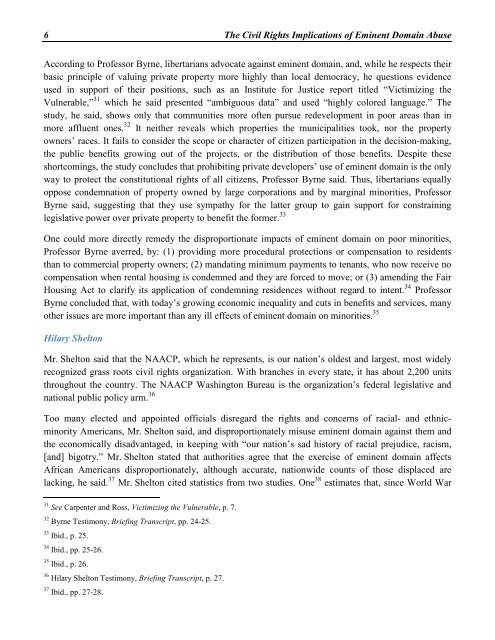Create successful ePaper yourself
Turn your PDF publications into a flip-book with our unique Google optimized e-Paper software.
6 The Civil Rights Implications of <strong>Eminent</strong> <strong>Domain</strong> AbuseAccording to Professor Byrne, libertarians advocate against eminent domain, and, while he respects theirbasic principle of valuing private property more highly than local democracy, he questions evidenceused in support of their positions, such as an Institute for Justice report titled “Victimizing theVulnerable,” 31 which he said presented “ambiguous data” and used “highly colored language.” Thestudy, he said, shows only that communities more often pursue redevelopment in poor areas than inmore affluent ones. 32 It neither reveals which properties the municipalities took, nor the propertyowners’ races. It fails to consider the scope or character of citizen participation in the decision-making,the public benefits growing out of the projects, or the distribution of those benefits. Despite theseshortcomings, the study concludes that prohibiting private developers’ use of eminent domain is the onlyway to protect the constitutional rights of all citizens, Professor Byrne said. Thus, libertarians equallyoppose condemnation of property owned by large corporations and by marginal minorities, ProfessorByrne said, suggesting that they use sympathy for the latter group to gain support for constraininglegislative power over private property to benefit the former. 33One could more directly remedy the disproportionate impacts of eminent domain on poor minorities,Professor Byrne averred, by: (1) providing more procedural protections or compensation to residentsthan to commercial property owners; (2) mandating minimum payments to tenants, who now receive nocompensation when rental housing is condemned and they are forced to move; or (3) amending the FairHousing Act to clarify its application of condemning residences without regard to intent. 34 ProfessorByrne concluded that, with today’s growing economic inequality and cuts in benefits and services, manyother issues are more important than any ill effects of eminent domain on minorities. 35Hilary SheltonMr. Shelton said that the NAACP, which he represents, is our nation’s oldest and largest, most widelyrecognized grass roots civil rights organization. With branches in every state, it has about 2,200 unitsthroughout the country. The NAACP Washington Bureau is the organization’s federal legislative andnational public policy arm. 36Too many elected and appointed officials disregard the rights and concerns of racial- and ethnicminorityAmericans, Mr. Shelton said, and disproportionately misuse eminent domain against them andthe economically disadvantaged, in keeping with “our nation’s sad history of racial prejudice, racism,[and] bigotry.” Mr. Shelton stated that authorities agree that the exercise of eminent domain affectsAfrican Americans disproportionately, although accurate, nationwide counts of those displaced arelacking, he said. 37 Mr. Shelton cited statistics from two studies. One 38 estimates that, since World War31 See Carpenter and Ross, Victimizing the Vulnerable, p. 7.32 Byrne Testimony, Briefing Transcript, pp. 24-25.33 Ibid., p. 25.34 Ibid., pp. 25-26.35 Ibid., p. 26.36 Hilary Shelton Testimony, Briefing Transcript, p. 27.37 Ibid., pp. 27-28.


